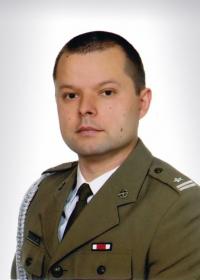Przemysław Wojciech Wachulak, PhD, DSc
Military University of Technology, Institute of OptoelectronicsAwarded the Young Scientist Medal on 23 March 2015 for developing new imaging methods for extreme ultraviolet and soft X-ray radiation.
Major Dr. Przemysław Wachulak was born on 14 October 1979 in Międzyrzec Podlaski, Poland. After graduating from the Electronic Technical School in this city in 1999, he began his studies at the Faculty of Electronics of the Military University of Technology in Warsaw, which he completed in 2004. He was an outstanding cadet student. In 2004, in Liptovský Mikuláš in Slovakia, he was awarded by the Rector of the Military University for the best student of the Military University of Technology. His Master's thesis, which he did under the supervision of Professor Waldemar Żendzian, concerned parametric laser generators with stimulation inside the resonator and was awarded in the Professor Smoliński competition for the best Master's thesis in the field of optoelectronics for the academic year 2003/2004. He completed his studies at the Military University of Technology with the best rating. As the best graduate of the Military University of Technology he was awarded by the President of Poland during the Armed Forces Day celebration.
In 2005 he was directed to PhD studies at the Faculty of Electrical and Computer Science of the University of Colorado in Fort Collins, USA. Przemysław Wachulak was twice awarded the first prize for the best poster message presented by the PhD student during the conference organized by the American Vacuum Society in 2006 and the conference organized by the Colorado Photonics Industry Association in 2008 and the Research Excellence Award from the International Society for Optical Engineering (SPIE) for scientific research in 2007. The doctoral degree has been nostrified by the resolution of the Council of the Faculty of Electronics and Information Technology of the Warsaw University of Technology. After his return to Poland in 2009, doctor Wachulak began working at the Institute of Optoelectronics of the Military University of Technology. As part of the HOMING programme of the Foundation for Polish Science, he received a grant for the implementation of a research project aimed at using laser-plasma radiation sources in the extreme ultraviolet range, developed at the Institute of Optoelectronics WAT, for imaging objects with a nanometre spatial resolution. The grant received under the HOMING programme also allowed for the continuation of research conducted by Dr. Wachulak during his PhD.
As a result, he completed two postdoctoral internships at the University of Fort Collins, during which he carried out research on Fourier holography with temporal resolution and holographic imaging with extended reference beam. At the same time, Dr. Wachulak was also the main executor in the Laserlab Europe project, carried out at the Institute of Optoelectronics of the Military University of Technology under the 7th EU Framework Programme. The results of his research work carried out during this period in Warsaw and Fort Collins were published in several scientific articles in renowned international journals. For these achievements, Dr Wachulak received in 2011 the Scholarship of the Minister of Science and Higher Education for outstanding young scientists.
In January 2013, the Council of the Faculty of Physics of the University of Warsaw awarded Dr. Wachulak a post-doctoral degree in physics (habilitation). For his scientific achievement, which is the basis for awarding the post-doctoral degree, he was also awarded the Director's Award of the Institute of Optoelectronics of the Military University of Technology in 2013 and the awards of the Rector of the Military University of Technology in Warsaw and the Minister of National Defence granted in 2014. Major Dr. Przemysław Wachulak took up the position of the head of a research project under the LIDER programme of the National Centre for Research and Development, the aim of which is to develop the EUV microscope for imaging objects with nanometre spatial resolution, as a device useful for practical applications in other areas of science and technology. He actively participates in the implementation of the EXTATIC doctoral programme at the Institute of Optoelectronics of the Military University of Technology within the European Erasmus Mundus programme. He is the scientific supervisor of two doctoral students and a consultant in three other doctoral projects in this programme. Since obtaining his post-doctoral degree he has been a member of the Council of the Institute of Optoelectronics of the Military University of Technology. He is also a member of the Scientific Committee of the Military Academy of Technology and secretary of the habilitation committee in the case of the first two habilitation proceedings conducted by the Council of the Institute of Optoelectronics of the Military Academy of Technology, after it has been authorised to confer the academic degree of post-doctoral degree.



